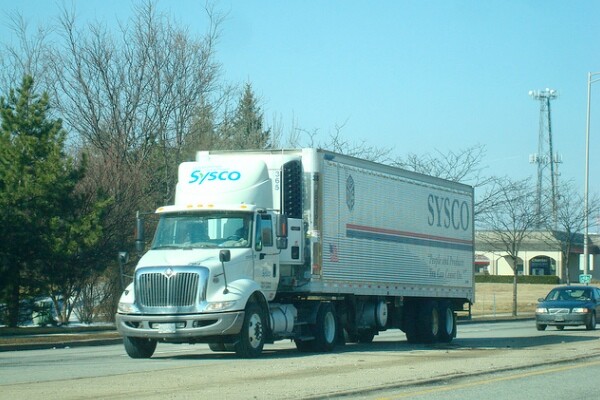Sysco Wants to Control More Than a Quarter of Our Food Supply

Coca-Cola. McDonald's. Tyson. Those are names that come to mind when we think about multi-billion dollar food corporations. But while they all have pretty big control on their respective markets, they may appear less sinister compared to some of the lesser-known entities controlling our food supply (if that's even possible). For example, Sysco Foods, the country's largest supplier of food.
They brought in a revenue of $44 billion in 2013. (To compare, McDonald's brought in $28 billion.) They're huge, in other words. And they don't want to stop there. They're trying to merge with their number one competitor, US Foods, which would make them even more dominant in the food industry.
So maybe you haven't heard of Sysco? One big reason is because they're not selling their products directly to you. Maybe you've seen their trucks traversing the highway system, but their logo is boring enough to blend into the rest of the scenery. Unless you're a buyer for a large enterprise that needs a constant supply of cheap food -- restaurants, hospitals, schools, hotels, etc. -- their advertising is not targeting you. According to their stat sheet, Sysco delivers roughly 400,000 products, approximately 41,000 of which they create on their own. (They also make plastic and foam products.)
Being a corporation and all, they're not quite satisfied with the reach they currently have. So, in December of 2013, Sysco laid out the broad plans to acquire US Foods, the second largest distributor in the country (with a revenue of only $18 billion a year). If the merger goes through, Sysco would control between 25% and 35% of the nation's food supply.
Now, it's not inevitable that the merger will go through. Throughout 2014, the two entities worked out the specifics of the deal, and they finally took their plan to the Federal Trade Commission towards the end of the year. (When deals of this size get made, the FTC has to make sure that the merger isn't creating a monopoly.) While the FTC was supposed to vote on it last week, they postponed the vote to allow Sysco to make a few more concessions in the hopes of allowing this deal to happen. (One concession they made is selling off 11 of their facilities to another company.)
But while there's a realistic possibility this merger gets blocked, it only forstalls the inevitable. What will happen next is either (a) lawyers get involved to push this through, or (b) Sysco makes another few small concessions to diminish their control on the industry. Both Sysco and US Foods want this to happen so, one way or another, it's going to get done. When it does, Sysco will fully dominate the market.
There's a lot to dislike about Sysco controlling that much of our food supply. In 2013, NBC Bay Area uncovered a series of unrefrigerated, outdoor sheds the company was using to store perishable items, such as dairy and meat. Apparently, this wasn't an accident, but a corporate-approved practice. Why?
Sources tell NBC Bay Area these sheds were used as a cost-efficient way to deliver small orders that weren't profitable enough to be delivered to customers in a refrigerated big rig truck.
The group ended up paying $19.4 million in fines, couch cushion money for a business of that size. But that doesn't mean the story is over. The key phrase to focus on in the explanation is "cost-effective." This, after all, is the main operating principle for nearly any corporation and unsurprising from a $44-billion a year enterprise. But while that mentality can work on products like furniture or linens, it shouldn't extend to consumable products delivered to over a quarter of our population.
Unrefrigerated perishables is just one of a number of possible concerns in the supply chain that puts profit over consumer well-being. Giving any corporation like that control of our country's food is unwise.